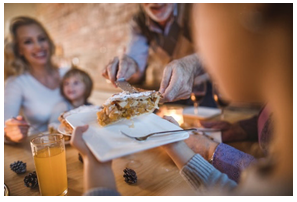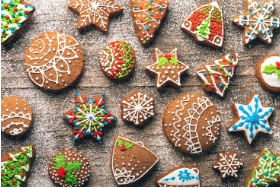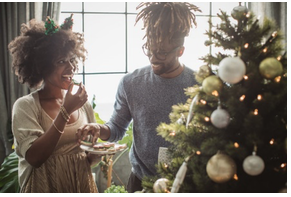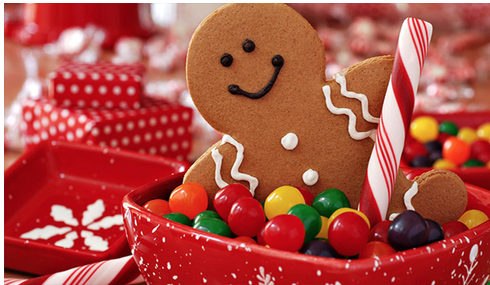WELLNESS--Thinking about indulging in some holiday cookies or hot cocoa? Holiday weight gain can be a source of anxiety for many people. All during a time that theoretically should be centered on joy and the sweeter things (literal and figurative) in your life.
You may think vilifying that pumpkin pie will keep you on track, but it’s actually doing the opposite. Stress around food may contribute to weight gain and mental health issues, experts say. Here’s what they want you to keep in mind as you navigate holiday parties, treats, dinners, drinks and more:
Holiday weight gain is usually pretty minimal.
 Here’s the deal: The stress around holiday weight gain often greatly outweighs the reality of the actual pounds gained. Research shows that holiday weight gain does happen, but it’s very minimal. One study on college-aged adults found that holiday eating only contributed to a half a pound to two pounds of weight gain. There’s a pretty good chance you might not gain anything at all.
Here’s the deal: The stress around holiday weight gain often greatly outweighs the reality of the actual pounds gained. Research shows that holiday weight gain does happen, but it’s very minimal. One study on college-aged adults found that holiday eating only contributed to a half a pound to two pounds of weight gain. There’s a pretty good chance you might not gain anything at all.
“Provided you’re maintaining the same weight regularly ― and provided you go back to your normal eating after the holidays ― if you mindfully indulged ... you should bounce back to your set point quickly,” said Lisa Mastela, a registered dietitian based in Los Angeles.
And it’s important to remember that going “overboard” and eating holiday treats isn’t going to completely destroy your health.
“Just know that one meal won’t make or break you,” said Joy Jacobs, an eating disorder specialist and assistant clinical professor at the University of California, San Diego’s School of Medicine.
But negative perceptions of food can harm you (without even taking a bite).
“We live in a world where we are told to ‘eat this’ and ‘not eat that,’ to label a food as good or bad and to create strict rules for ourselves,” said Amy Chadwick, a licensed naturopathic doctor at Four Moons Spa in San Diego. She said the idea of eating can cause “aversion, shame, self-punishment, fear and tension in these holiday moments where food is shared.”
Such a relationship with food can lead to negative outcomes if left unchecked, said Autumn Bates, a certified clinical nutritionist based in Los Angeles.
“When you stress over that piece of homemade apple pie that your grandma makes each year — because you want it, but you also think it’s not ‘clean’ or ‘healthy’ ― it actually causes a hormonal response in your body,” she said. The negative perception of holiday foods as “bad” spikes cortisol (the stress hormone), which can lead to physical health effects ― including weight gain ― over time.
Indulging in treats might actually help you reach your goals.
 In the end, it might not be the skipped serving of mac and cheese that got you to your goal weight — it might be that you ate it and enjoyed it, without guilt.
In the end, it might not be the skipped serving of mac and cheese that got you to your goal weight — it might be that you ate it and enjoyed it, without guilt.
A study published in the Journal of Consumer Psychology found that “goal-deviation behaviors” (i.e., eating nondiet food on a diet) helped people self-regulate, stay motivated to meet their goals and feel positive.
“This is a practice I personally follow, and one that I teach to my clients,” Bates said. Throughout the regular calendar year, even beyond the holidays, Bates schedules “one day a week where you treat yourself.”
But she’s careful about what she calls it.
“I don’t like to use the word ‘cheat day,’ because that implies that you’re doing something wrong — cue increase in cortisol,” she said.
This certainly applies to the festive time of year, as well, Bates said. “When it comes time to head to holiday parties, enjoy your glass of eggnog or sugar cookie and treat it as what it is — a treat,” she added.
Depriving yourself could lead to overeating later on.
If you needed more reason to order the peppermint mocha or cut into the bread pudding, consider that deprivation can lead to bingeing.
“Trying to limit yourself often ends up in overindulgence,” Mastela said. “This may end up leading to guilt and shame, which can spiral. The guilt causes stress, stress causes fatigue, fatigue makes it more difficult to exercise and choose healthy foods — it’s a snowball effect.”
And whatever you do, don’t punish yourself after an indulgence or “prep” for a holiday meal by starving yourself.
 “Nourish yourself consistently,” Mastela said. “Restricting eating during the day will only lead to bingeing at night, and no matter how much you eat that night, you’ll still need to eat the next day.”
“Nourish yourself consistently,” Mastela said. “Restricting eating during the day will only lead to bingeing at night, and no matter how much you eat that night, you’ll still need to eat the next day.”
If you want to prepare for holiday festivities, Bates recommends eating healthy, filling foods leading up to it.
“Have your regular nutrient-dense meals like a filling smoothie rich in satiating healthy fats, or a fibrous, nutrient-dense soup,” Bates said. “They’ll leave your body feeling satisfied and nourished.”
Other Ways To Deal If You’re Stressed About Holiday Eating
If you’re feeling anxious about food, there are ways to manage it so you can enjoy yourself both in the moment and long-term. Here are a few options, according to each health expert:
Breathe.
“Do a five-minute deep-breathing session before dinner to center yourself and enhance the experience,” Mastela said. “Think ahead: Daydream about some of your favorite dishes you’ll encounter, and how joyful it’ll be to relax and eat them with family.”
Space out your courses.
Your brain sometimes doesn’t know it’s full until well after your meal, so Mastela advised waiting 20 minutes before going for seconds.
Choose treats in advance.
If it’s helpful, make a mental list of the treats you’re looking forward to and select them with enthusiasm when the time comes. “Try to pre-plan as much as possible,” Jacobs said. ”Pick your favorite foods, and enjoy those.”
Savor.
Don’t just eat the food, but enjoy the whole experience. This process, also known as intuitive or mindful eating, lets you to eat what you want ― slowly ― and relies on listening to your body, which will tell you when you’re full.
“Savor each bite and enjoy yourself,” Bates said. “Remember, the more you stress about the food you’re eating, the more your cortisol levels will spike. ... Instead, take your time, analyze each bite and enjoy the flavors of the holiday season.”
(Dominique Astorino is on assignment for HuffPost …. Where this piece was first posted.)
-cw

















